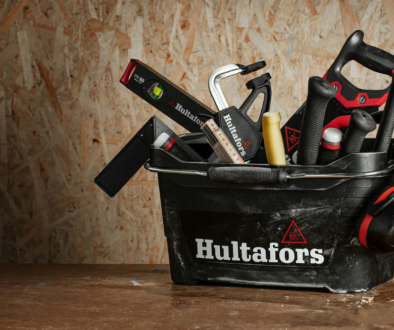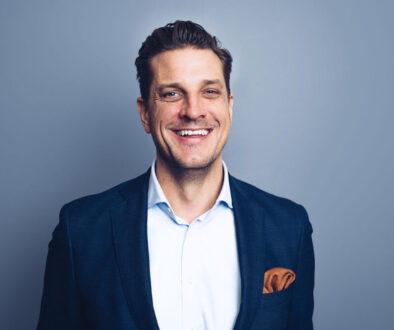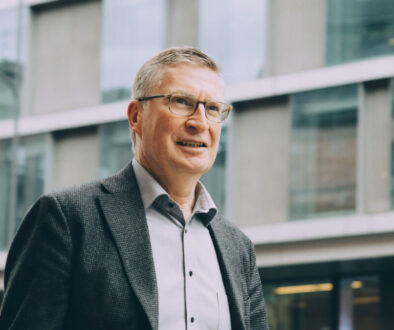A humanistic approach
One of Sweden’s most progressive CEOs has set about refreshing the culture at supply chain development partner Sonat, bringing in circular thinking and new business ideas.

There is something informal with entering the office at Sonat, the strategic and operative logistics partner located at Vasagatan in central Stockholm. If you have been to your fair share of supply chain companies, you will be fast to see the differences. People are sitting together, sharing work, socially gathering in meeting spaces. You might expect your logistics partner to be a stark landscape, on the contrary, at Sonat, you immediately feel a sense of ease. As the brand’s newish CEO Mattias Norin admits, ‘Many people that work with supply chain sit siloed’. ’At Sonat, we work together across multi-disciplinary teams,’ says the 48-year-old who returned to the company at the end of 2018, to take the lead from the beginning of 2020. ‘We are growing Sonat as a value-driven brand with clear workplace ethics, based on humanism, integrity, collaboration, development, professionalism and true customer orientation.’
Norin is sat comfortably in a meeting room, he is smiling with optimism. ‘Of course, we want to be profitable and grow as a company, but our goal is to pioneer the supply chain, creating sustainable business rhythms that go beyond the monetary value of the market today,’ he says. When Norin is referring to “business rhythms” he is specially referring to a new creative strand of the business that works closely with clients to achieve a circular supply chain. ‘The cross-pollination of our unified experience and knowledge at Sonat has given us the optimal platform to tackle sustainability within the flow of goods and services, these challenges trigger us to come together,’ he explains.
Norin’s love affair with complex supply chain solutions began in 2004, but after twelve years in the business, he took a couple of years out of Sonat. Upon his return, he brought with him new idea within circular thinking. ‘When I came back to Sonat, the supply chain market had become increasingly important. However, I still felt that the connection between effectivity, transparency and circularity was missing,’ he says, ‘Building a non-linear supply chain architecture is, of course complex, and puts more pressure on the logistics and integrations upfront, the reward is the cost and climate effectiveness reached long-term.’
Sonat’s integrity, intellect and operative heritage make a good match for transformation management and business acceleration. Founded in 2000, the brand did well, largely owning a balanced offering of outsourcing and consulting services. But Sonat really garnered attention in the last couple of years. And with a new 80/20 operative to strategic solutions model, Norin is looking to grow. ‘Since 2010, we had a series of successful long-term commitments and this year we are looking to nurture all-encompassing contracts. The plan is to grow through extending the transformation management services offering climate effective supply chain partnerships.’
Norin also brings out an interesting principle of creativity: ‘we use a typical investigative methodology, were we conduct qualitative interviews with our clients and then bring back key findings into a workshop scenario, this to design the most fitting and bespoke platform, where hours of creative analysis is applied.’ While injecting creativity in businesses is not new, it feels like a distinct Sonat way of approaching supply chain: going deeper into the organisation to orchestrate and solve the true flow of business. ‘Our collaboration with the customer often entails challenging every step of the chain, often transforming the business to beat the competitive landscape. What sets us apart is relying on a bespoke, creative strategy, focusing on the outcome without being stuck in the process itself.’
The Sonat office does feel like a creative place, ready for any challenge. One of Norin’s notable moves is to increase the flexibility within the teams, carefully leading an ensemble of creative and operative skills. ‘We have found an unconventional way to work together, and I believe these multidisciplinary teams formulate our most unique asset,’ Norin says proudly: ‘When the customer realises that we will use all our competencies to accelerate their channels, they often feel confident to take greater risks, resulting in dominant competitive advantages.’
When the discussion turns to the future of Sonat it is obvious that Norin already has enough ideas to keep his team busy for the next decade. A plan for growth has been rolled out and more services will be added to the brand offer, he also speaks of new partnerships that will invigorate Sonat’s platform. He talks about Sonat as a sum of its parts, “one plus one is three”. Does this mean a wider business acceleration platform, perhaps? ‘We have a role to play in creating better circular business solutions,’ he says. What about a Sonat emissions program? ‘We have to put pressure on all channels to create sounds ways of enabling leaner logistics, Norin concludes: ‘what we do at Sonat is asking the important questions.’ You heard it here first. Make sure to be part of the new way of looking at your business – or rather, your circular supply chain.
He talks about Sonat as a sum of its parts, “one plus one is three”. Does this mean a wider business acceleration platform, perhaps? ‘We have a role to play in creating better circular business solutions,’ he says. What about a Sonat emissions program? ‘We have to put pressure on all channels to create sounds ways of enabling leaner logistics, Norin concludes: ‘what we do at Sonat is asking the important questions.’ You heard it here first. Make sure to be part of the new way of looking at your business – or rather, your circular supply chain.


